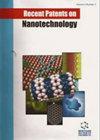Tomato as a Natural Source of Dyes in the Food Industry: A Patent Data Analysis.
IF 3.1
4区 材料科学
Q3 MATERIALS SCIENCE, MULTIDISCIPLINARY
引用次数: 0
Abstract
BACKGROUND Foods that promote health benefits are being increasingly used. Innovative techniques, such as nanotechnology, have been used to improve functional properties, sensory characteristics, or the conservation of foods. OBJECTIVE The objective of this study was to identify the technological domain of patents for tomato products with or without nanotechnology and elucidate the technological advances associated with the recent use of tomatoes as a natural food dye in the food industry by exploring patent documents. METHODS AND RESULTS The search was conducted using the Espacenet and INPI databases. There was an increase in patent document applications employing nanotechnology in 2013, with a peak between 2017 and 2018. China is the lead country in the number of patent applications. In Brazil, the patent applications are variable, and the food industry is most involved in studies on tomatoes as a natural food dye. Most patent deposits using nanotechnology were from companies, and the main sources of the patent application were the food and pharmaceutical industries. CONCLUSION There is an increasing trend for the use of tomatoes as natural food dyes, produced with or without nanotechnology, and number of patents filed yearly. New technologies are being developed in several application areas.番茄作为食品工业染料的天然来源:专利数据分析。
背景:促进健康益处的食物正被越来越多地使用。创新技术,如纳米技术,已被用于改善功能特性,感官特征,或食品的保存。目的:本研究的目的是通过对专利文献的研究,确定含有或不含纳米技术的番茄制品的专利技术领域,并阐明最近在食品工业中使用番茄作为天然食用染料的技术进展。方法与结果:采用Espacenet和INPI数据库进行检索。2013年,采用纳米技术的专利文件申请有所增加,2017年至2018年达到峰值。中国是专利申请数量最多的国家。在巴西,专利申请是多变的,食品工业主要参与番茄作为天然食用染料的研究。使用纳米技术的专利存款大多数来自公司,专利申请的主要来源是食品和制药工业。结论:番茄作为天然食用色素,不论采用纳米技术还是不采用纳米技术,都有日益增长的趋势,而且每年申请的专利数量都在增加。在几个应用领域正在开发新技术。
本文章由计算机程序翻译,如有差异,请以英文原文为准。
求助全文
约1分钟内获得全文
求助全文
来源期刊

Recent Patents on Nanotechnology
NANOSCIENCE & NANOTECHNOLOGY-MATERIALS SCIENCE, MULTIDISCIPLINARY
CiteScore
4.70
自引率
10.00%
发文量
50
审稿时长
3 months
期刊介绍:
Recent Patents on Nanotechnology publishes full-length/mini reviews and research articles that reflect or deal with studies in relation to a patent, application of reported patents in a study, discussion of comparison of results regarding application of a given patent, etc., and also guest edited thematic issues on recent patents in the field of nanotechnology. A selection of important and recent patents on nanotechnology is also included in the journal. The journal is essential reading for all researchers involved in nanotechnology.
 求助内容:
求助内容: 应助结果提醒方式:
应助结果提醒方式:


